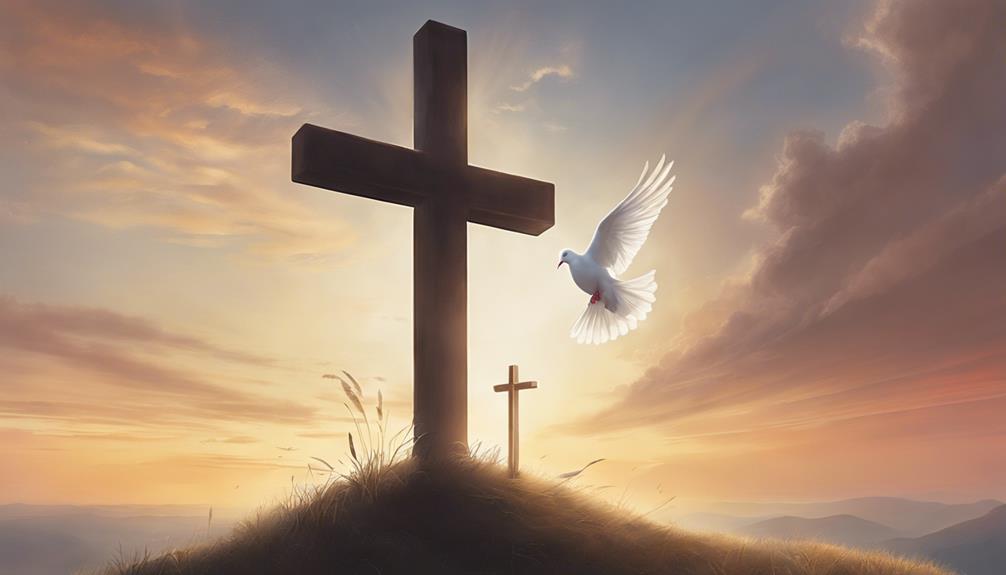Taking a deep dive into Ecclesiastes 3:1-2, we explore the profound implications of the Bible's poignant verse about life, death, and the timing of it all.

A Verse in the Bible About Death
You might not be aware that the Bible, in Ecclesiastes 3:1-2, states 'There is a time for everything, and a season for every activity under the heavens: a time to be born and a time to die…'.
This verse, while seemingly straightforward, has sparked numerous interpretations and debates among theologians and scholars alike.
What does it truly mean to say there's a time to die? Is this verse comforting or unsettling?
Let's embark on an exploration of these questions, as we untangle the rich layers of this biblical passage.
Key Takeaways
- Ecclesiastes 3:1-2 in the Bible presents death as part of a divinely timed sequence of life.
- Death, according to the scripture, is a transient stage in the rhythm of existence.
- Christian beliefs interpret death as a transition into eternal life, not an end.
- The verse instructs believers to approach mortality with peace, viewing it as a stepping stone to eternal life.
Understanding Death in Biblical Context

To fully grasp the concept of death in the Bible, you must delve into the historical and cultural context in which these texts were written. Death, during the biblical era, wasn't solely a physical cessation of life. It was also conceived as a separation from God, the source of life, and thus carried profound spiritual implications.
The Hebrew Bible, or Old Testament, often depicts death as a shadowy, uncertain realm called Sheol. Its inhabitants aren't lively beings, but 'rephaim', weak and faint echoes of their former selves. This depiction suggests a conception of death as a diminished existence, rather than an absolute end.
Conversely, the New Testament, influenced by Greek philosophy and emerging Christian theology, begins to hint at the possibility of an afterlife, a resurrection. However, it's crucial to understand that the emphasis wasn't so much on the continuation of individual existence, but on the restoration of divine-human relationships fractured by sin and death.
Therefore, understanding death in the Bible isn't about reconciling contradictory views, but about appreciating how these diverse perspectives reflect the evolving beliefs and hopes of a specific historical community.
Delving Into Ecclesiastes 3:1-2

Building on this understanding of death in biblical context, let's turn our attention to Ecclesiastes 3:1-2, a key scripture that provides fascinating insights into the biblical view of life, death, and divine timing. Penned by Solomon, a figure renowned for his wisdom, this verse serves as a poignant reflection on mortality and the cyclical nature of existence.
Ecclesiastes 3:1-2 states, 'To every thing there's a season, and a time to every purpose under the heaven: A time to be born, and a time to die; a time to plant, and a time to pluck up that which is planted.' Here, the verse illustrates the concept of divine timing, emphasizing the rhythm and order inherent in life and death. It implies that birth and death aren't random events, but rather part of a divinely orchestrated sequence.
The verse promotes acceptance of life's inherent ebb and flow, underscoring the inevitability of death as part of this cycle. It's not a grim portrayal of death, but rather a recognition of its place in the grand scheme of existence. This perspective on death, intertwined with life's other stages, offers a unique lens through which to consider the biblical view of mortality.
Interpretation of the Chosen Verse

Diving deeper into Ecclesiastes 3:1-2, you'll find that its interpretation offers profound insights into the cyclical pattern of life and death from a biblical perspective. The verse posits that there's a time for everything, including a time to be born and a time to die. This isn't just a simple assertion; it's a philosophical exploration of the transient nature of existence.
Understanding this verse requires acknowledging the context in which it was written. It's part of a larger discourse on the meaning and purpose of life. The author, traditionally believed to be King Solomon, reflects on the human condition, expressing a sense of futility at the repetitive cycles of life.
Yet, the verse also underscores the inevitability of death, suggesting acceptance rather than dread. It serves as a reminder that life and death are parts of a larger divine plan, beyond human comprehension. The cyclical pattern implies that death isn't an end, but merely a stage in the ongoing rhythm of existence.
This interpretation, while nuanced, encourages a balanced outlook on life and death, promoting acceptance and understanding of the natural ebb and flow of existence. It instills the idea that the cycle of life and death isn't only inevitable but also purposeful.
Death From a Christian Perspective

In exploring death from a Christian perspective, it's crucial to understand that this faith tradition views mortality not as an ending, but as a transition into eternal life. You'll find that the Christian faith's perception of death is deeply rooted in the resurrection of Jesus Christ. This seminal event in Christian theology signifies victory over death, making it a gateway to eternal life, rather than a finality.
This viewpoint is supported by numerous Biblical passages, particularly in the New Testament. For instance, John 11:25-26 reads, 'Jesus said to her, 'I am the resurrection and the life. The one who believes in me will live, even though they die; and whoever lives by believing in me will never die.'' It's a clear assertion of the Christian belief in life after death.
However, it's important to note that the Christian concept of death isn't about escaping this world for a better one. Rather, it's about the anticipation of a renewed, resurrected life. A life that's redeemed, restored, and eternal. Therefore, death, in a Christian context, isn't to be feared but understood as a spiritual transition into a higher form of existence.
Applying Biblical Wisdom to Mortality

Grasping the wisdom embedded within the Bible can provide valuable insights into how we perceive and cope with our mortality. You're called to understand death not as an end, but a transition to eternal life. This perspective, borne out of biblical teachings, can fundamentally reshape your views on mortality.
Consider the verse Ecclesiastes 3:1-2 which states, 'To everything there's a season, and a time to every purpose under the heaven: A time to be born, and a time to die'. This verse reminds you that death is a natural part of life's cycle, and it's not to be feared. Your focus, instead, should be on fulfilling your purpose during your earthly existence.
Furthermore, the verse in 1 Corinthians 15:55, 'O death, where's thy sting? O grave, where's thy victory?' encourages you to view death not as a victor, but as a defeated foe, thanks to Christ's resurrection. Through these biblical pearls of wisdom, you can face your mortality with a sense of peace, understanding that it's merely a stepping stone to eternal life, not a dreadful end.
Conclusion
In grasping Ecclesiastes 3:1-2, you've explored the cycle of life and death from a biblical perspective. You've seen how Christianity perceives death not as an ending, but a divine transition. By applying this wisdom, you may view mortality in a new, enlightened way.
Hopefully, this exploration has provided you with comfort, understanding, and a deeper faith in life's cyclical nature as depicted in the Bible. Remember, every season has its time.



Sign up